Multi-touch attribution for LinkedIn ads is absolutely necessary for fair revenue and pipeline attribution.
But most conventional solutions like the LinkedIn CAPI, Insight tag, Campaign Manager, IP matching software, or CRMs fail at providing accurate view-through multi-touch attribution.
Let’s see why conventional methods/tools fail and what works.
Multi-Touch Attribution for LinkedIn Ads: Short Summary
- Most attribution tools ignore non-click LinkedIn ad engagements, which are the majority.
- Conventional tools like CAPI, Insight Tag, CRMs, and IP tools fail at view-through, multi-touch attribution.
- LinkedIn CTR is low (~0.5%), so you’re blind to 995 out of 1000 impressions with click-only methods.
- ZenABM solves this with:
- Company-level engagement tracking via LinkedIn’s API
- Bi-directional CRM sync (HubSpot)
- Real-time engagement scoring, auto BDR routing, and buyer intent mapping
- Plug-and-play ROI dashboards for campaigns
- Plans start at $59/month, with a free trial available.
- If you want real, pipeline-connected LinkedIn ad attribution, try ZenABM.
Why is Multi-Touch Attribution for LinkedIn Ads Necessary
A multi-touch attribution model is the only way to not devalue your LinkedIn ad campaigns.
I mean, I recently signed up for Relevance AI.
I had seen dozens of their ads in my feed but never clicked.
When the AI agents’ FOMO became unbearable, I searched for them organically. Now, if the folks at Relevance AI use conventional methods, they might never know that the credit for my signup and paid subscription goes to LinkedIn ads and not just SEO.
Similar scenarios are just too common on LinkedIn. After all, the CTR is so low:
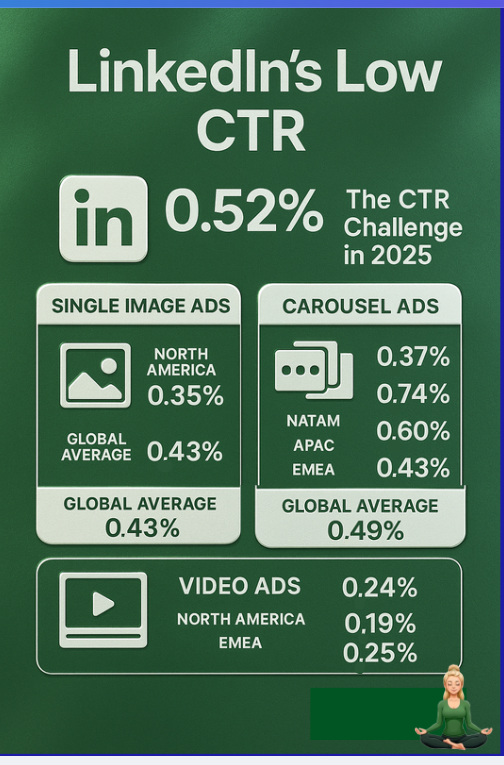
So, a click-through/last touch approach can make your attribution extremely misplaced!
This ‘no-click, yet impact’ reality only intensifies for B2B, where entire buying committees make decisions.
Let me explain with another example: Let’s say you target 10 people at an account. Now, those ads build awareness and shape perception, but if no one clicks, traditional attribution says the ads did nothing.
That’s the dark funnel in action. Enterprise deals involve multiple stakeholders and touchpoints, most of which go untracked. A prospect might see your ads, engage silently, then convert via organic search or sales outreach. The ads worked, but didn’t get the credit.
What we need is account-level, multi-touch attribution for LinkedIn ads that tracks every impression and engagement to see LinkedIn’s true impact on pipeline and revenue.
Why Conventional Methods Fail at Multi-Touch Attribution
The standard attribution methods, including LinkedIn Insight Tag, Conversions API (CAPI), LinkedIn Campaign Manager, your CRM’s ad tracking, and even fancy IP deanonymization software, all fail at multi-touch attribution for LinkedIn ads.
Here’s why:
LinkedIn Insight Tag & CAPI
LinkedIn offers an Insight Tag (a JavaScript pixel you put on your site):
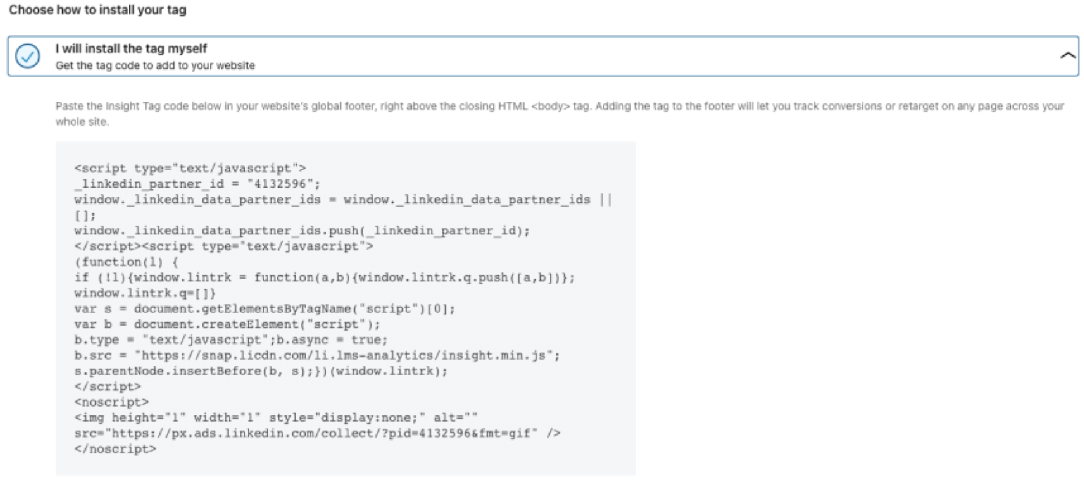
and a server-side Conversions API to help track leads from ads.
These work decently for basic click attribution. For example, if a person clicks a LinkedIn ad and fills out a form in the same session, you’ll see that conversion come through. If the form fill happens later, or not at all, both CAPI and the Insight tag often fail to tie the person back to the ad (thanks to browser privacy changes and cookies getting phased out).
So, if someone only views the ad without clicking?
They remain invisible to these trackers.
This is a major flaw because LinkedIn, we discussed, is a notoriously low-click environment. The average click-through rate (CTR) on LinkedIn ads is only around 0.5%.
That means 995 out of 1000 people will see your ad and not click it. The Insight Tag and CAPI simply ignore those 995 impressions as if they had zero impact.
Native Tracking in CRMs
CRMs provide their own pixels to attribute site visits or whatever conversion you have set up to LinkedIn, but they are click-based, too.
HubSpot’s LinkedIn Ads integration, for instance, will log a contact if they clicked an ad and converted on a form, but it also requires that conversion to happen in one web session.
If the sessions of ad click and form fill were separate, HubSpot would depend on cookies.
So, if the user clears the cookies, it won’t be able to attribute the conversion to the ad click:
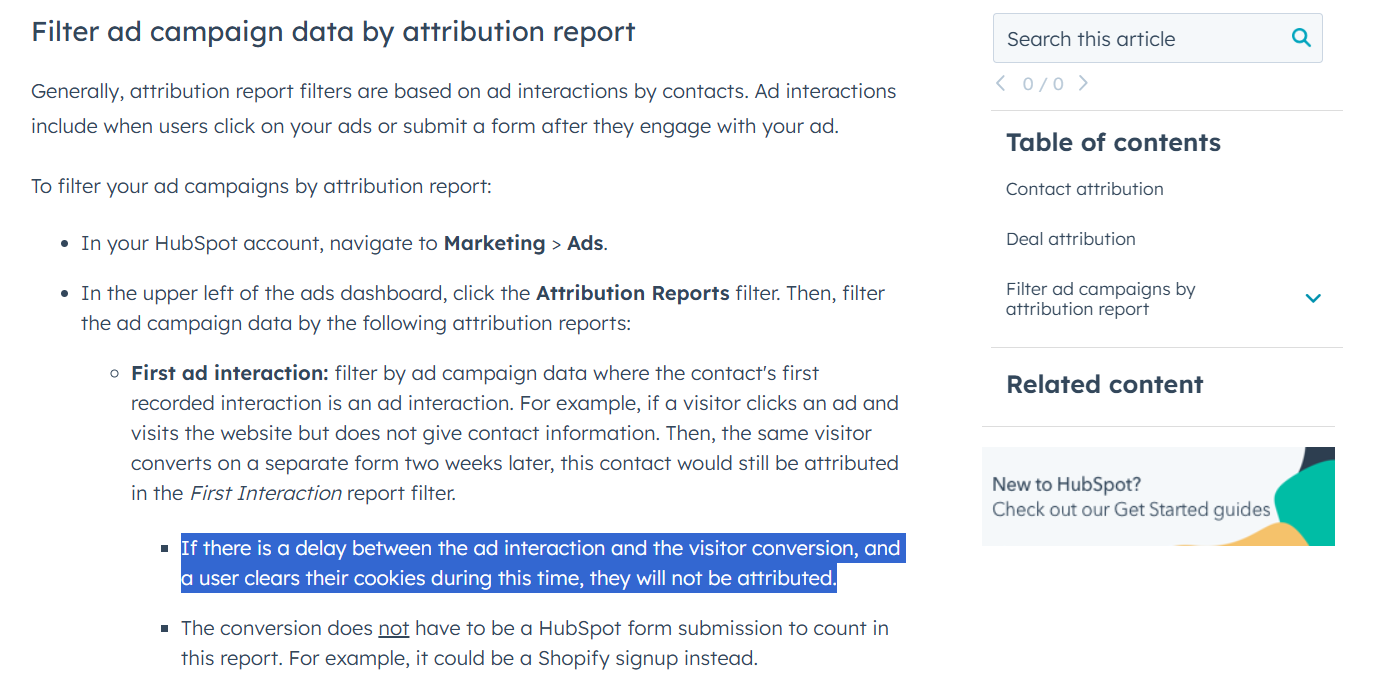
So, not only is the CRM’s attribution ability limited to clicks, but it also demands an immediate conversion via a form fill.
IP Deanonymization Tools
Web visitor deanonymization tools don’t solve the low CTR crisis, but help you bypass the form-fill limitation.
They can reveal the visitor’s identity at the account level.
Yes, first of all, to be sure if the visitors have come from an ad, you have to set up UTM parameters on your LinkedIn ads or maybe build an entirely new domain.
Then?
Then these tools disappoint with their ridiculously low accuracy (42% at best, says Syft):
Here’s one more disappointing story of these IP matching tools:
“The accounts we were targeting simply wouldn’t show up in any website visits, even though we knew they landed on the landing pages for the ABM ads we created specifically for them.
How do we know? We’ve actually set up a separate no-index domain for our ABM ad campaigns to be sure 100% of the traffic landing there is our ‘target accounts’. And sadly, from the ~300 visitors to a certain page path on that website, in 90 days, Breeze Intelligence (based on Clearbit’s API) identified only 1 company… ourselves!”
-Emilia Korczynska, VP of Marketing, Userpilot
Also, as these tools reveal site visitors, they only come into the picture when there’s a click.
View through attribution is just absent here, too.
LinkedIn Campaign Manager
LinkedIn Campaign Manager was totally out of the question for attribution capabilities for ABM, until they rolled out the ‘Companies Tab” in 2024:
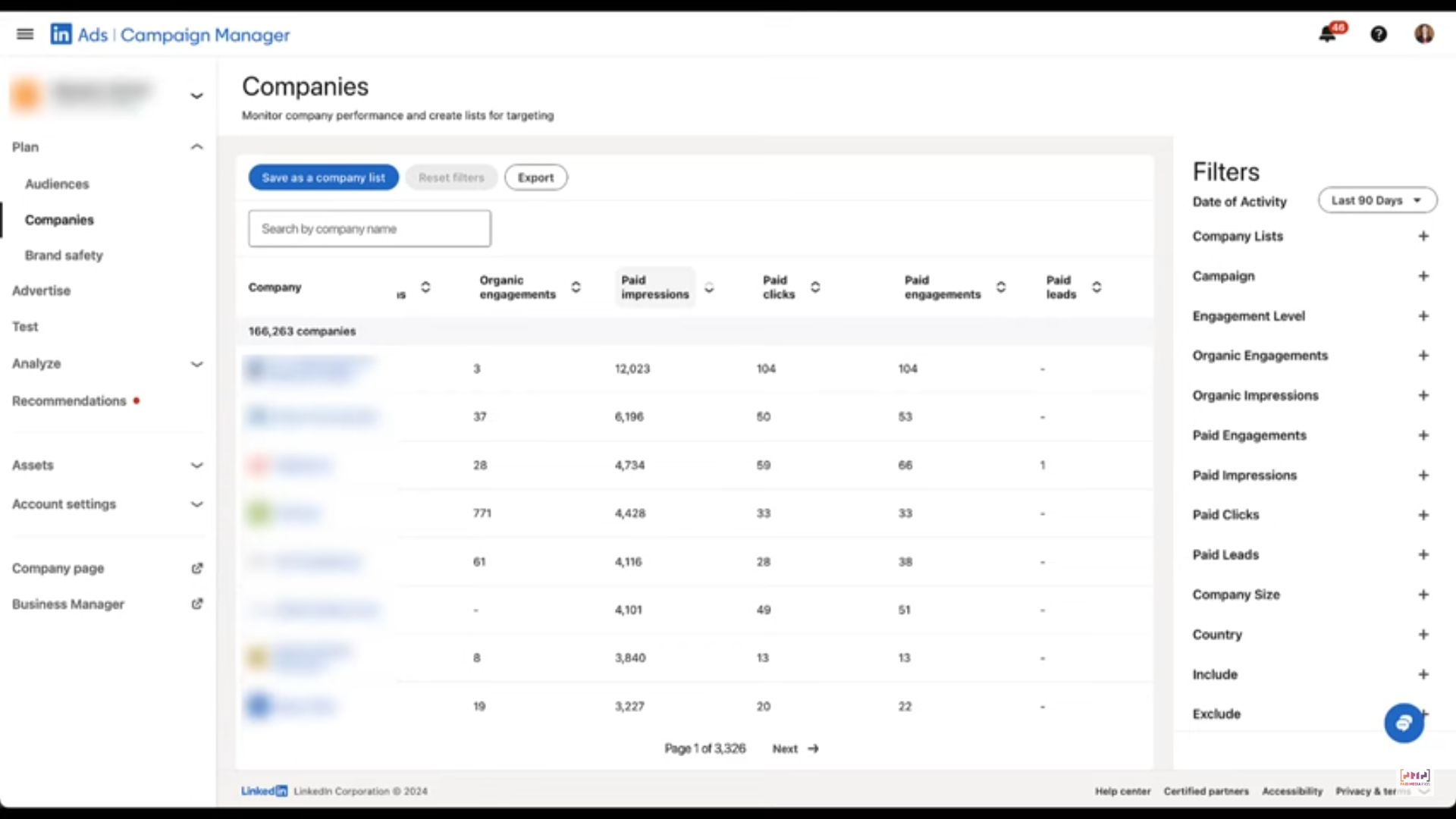
Now, you can see a lot of company-level LinkedIn ad engagement metrics like paid impressions, paid clicks, etc.
This company-level impression tracking does provide the view-through attribution we have been talking about.
But the tab is still far from enough because all these metrics have been aggregated to your whole ad account. So, “Company X saw or clicked some of your ads” is what you see.
You still can’t track company-level impressions, clicks, and engagements for each particular ad.
So, yes, Company X clicked/saw your ad, but which ad?
Most ABM managers run multiple ABM campaigns at a time. These ABM campaigns have many campaign groups within them. Those campaign groups further branch into multiple ad campaigns.
Take this ABM campaign structure for example, which was used by Userpilot:
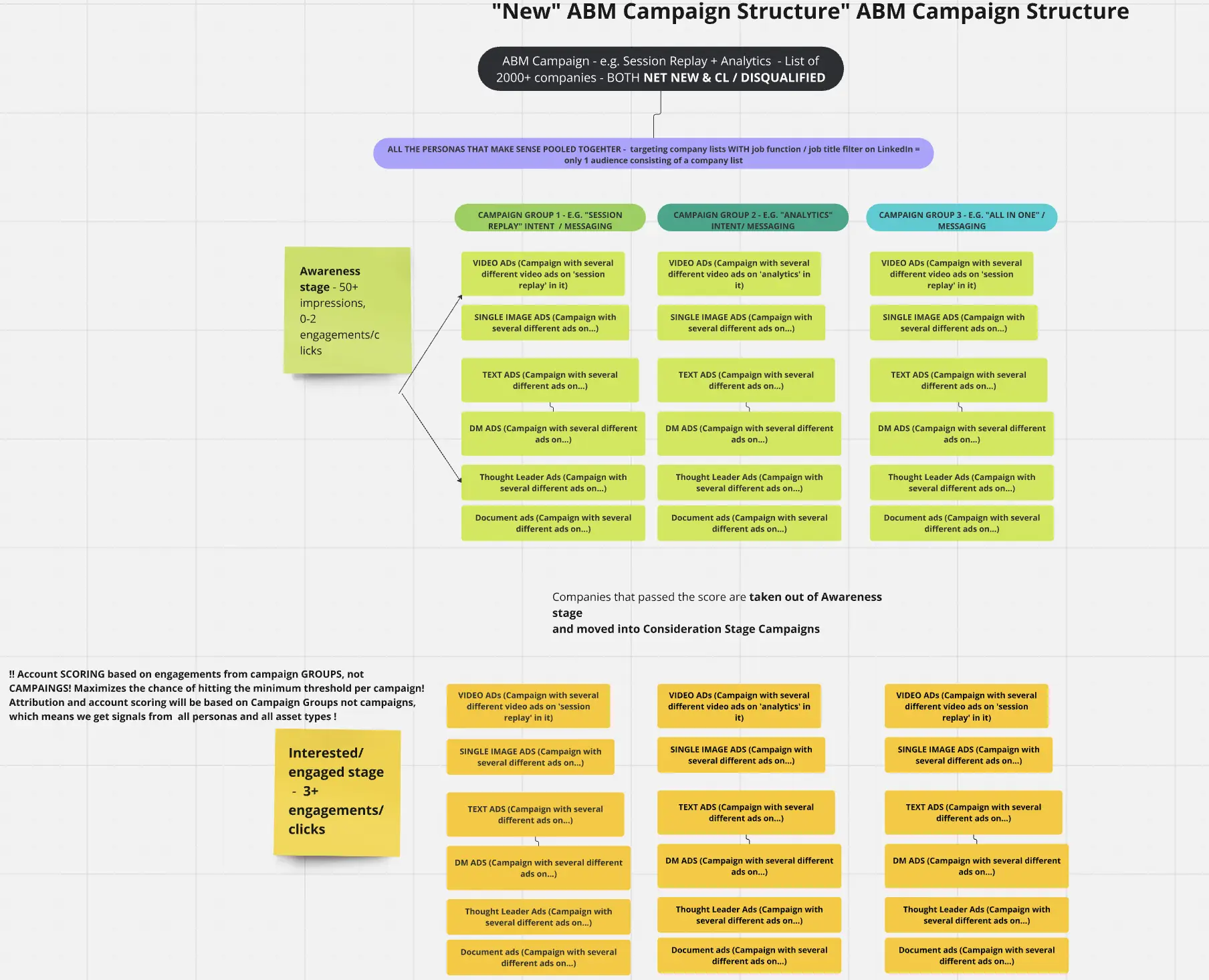
All these different ad campaigns, campaign groups, and ABM campaigns differ from each other on the basis of:
- Type of ad asset
- Campaign budget, frequency, time, manager, etc.
- Buyer’s intent, i.e. what feature/quality of your product/service is being advertised by the ad.
So, knowing company-level impressions, clicks, and engagements for each ad campaign, campaign group, and ABM campaign becomes necessary to be able to attribute the impact of each LinkedIn ad on the pipeline and revenue.
I mean, multi-touch attribution for LinkedIn ad simply means knowing all ads a company engaged with before converting.
With all the company-level metrics rolled up to the whole ad account, multi-touch attribution is impossible.
Bottom Line: Conventional methods/tools are incapable of providing multi-touch attribution for LinkedIn ads. Here, LinkedIn ads often end up looking like they generated little or no pipeline, when in reality, they may have heavily influenced deals. The view-through and multi-touch effects are essentially invisible to these tools. As a result, LinkedIn gets undervalued in the marketing mix, and you struggle with ROI attribution to LinkedIn ads.
Using ZenABM for True Multi-Touch Attribution for LinkedIn Ads
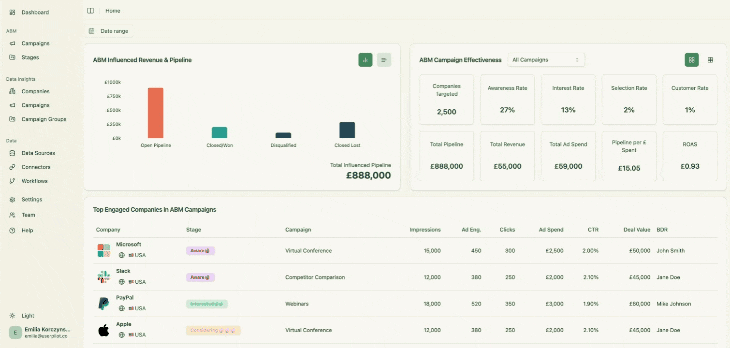
ZenABM’s platform is laser-focused on solving LinkedIn Ads attribution for ABM.
It essentially plugs the gaps in traditional tools by pulling first-party data from LinkedIn and combining it with your CRM data in a single view.
The result: every impression, click, and engagement from your LinkedIn campaigns is tracked at the company level and tied back to pipeline and revenue automatically.
Here’s how ZenABM addresses the issues we outlined, and why it’s a breakthrough for ABM marketers:
ZenABM is purpose-built for LinkedIn ads ABM and tracks LinkedIn ad conversions accurately with these features:
Company-Level Engagement Tracking Per Campaign

ZenABM captures all companies that:
- Only view your ad (impressions)
- Engage with your ad (like/comment)
- Click on your ad
So it natively tracks view-through engagement from every touch. For example, if a prospect’s company saw your LinkedIn post-ad 50 times, then later came inbound on its own, ZenABM would still credit those 50 impressions.
And yes, ZenABM extracts this data from LinkedIn’s official API – no reliance on cookies, IP matching or third-party data sources.
Bi-Directional CRM Integration
ZenABM’s CRM integration is native, no-code and bi-directional
Connects LinkedIn Ads to Actual Pipeline & Revenue
ZenABM connects the LinkedIn campaign impressions and engagement to deals in your CRM:
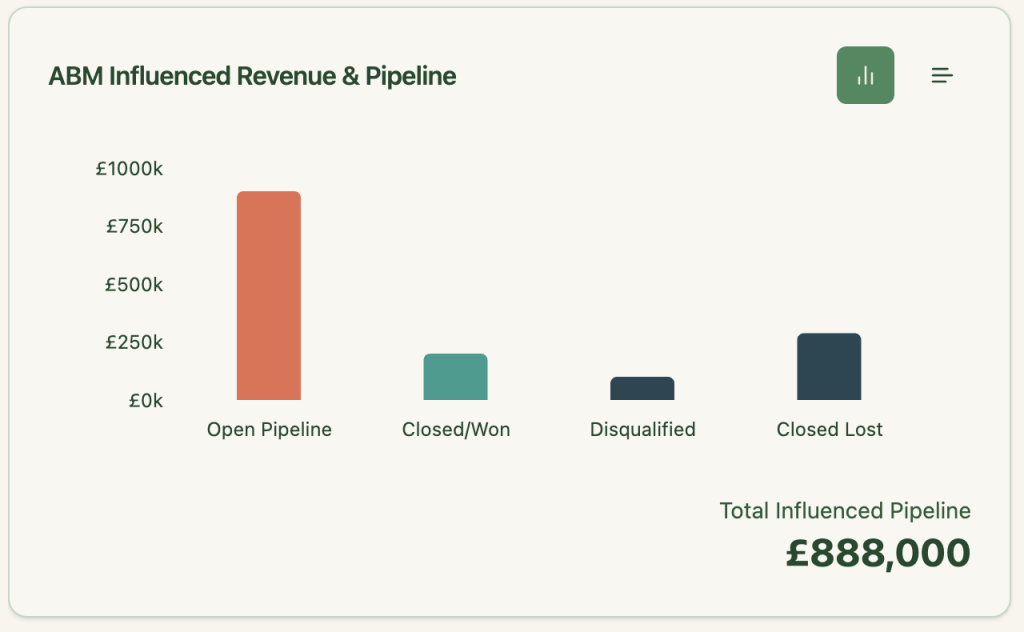
So you can finally say:
- “This ad campaign drove $75k in the pipeline”
- “This campaign group touched 22 deals that closed”
- “ROI for this quarter’s LinkedIn spend = 5.2x”
Pushes All Engagement Data into HubSpot Automatically as Company Property
ZenABM pushes LinkedIn Ad engagement data to HubSpot as company properties:
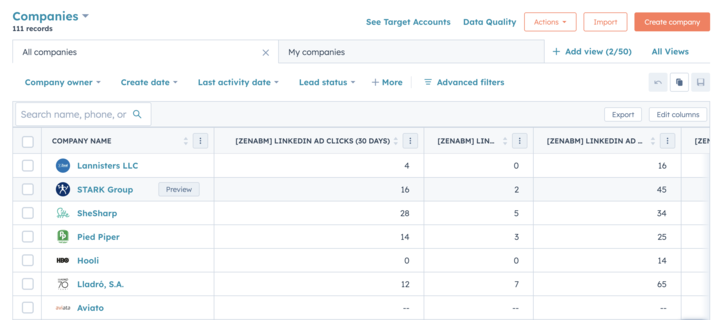
Automated Lead Scoring and Assignment to Your BDRs with Intent Information
ZenABM calculates a real-time “Current Engagement Score” based on impressions, clicks, and recency across all campaigns:

Then ZenABM assigns those accounts to your BDRs in HubSpot automatically:

Also, ZenABM helps you tag each campaign with buyer intent.
Then the tool groups engaged companies sharing a similar intent:
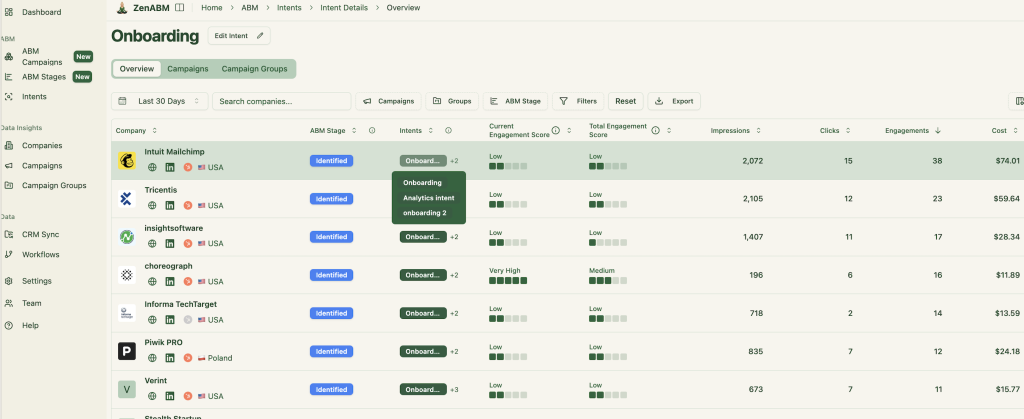
And the intent data is also pushed to the CRM:
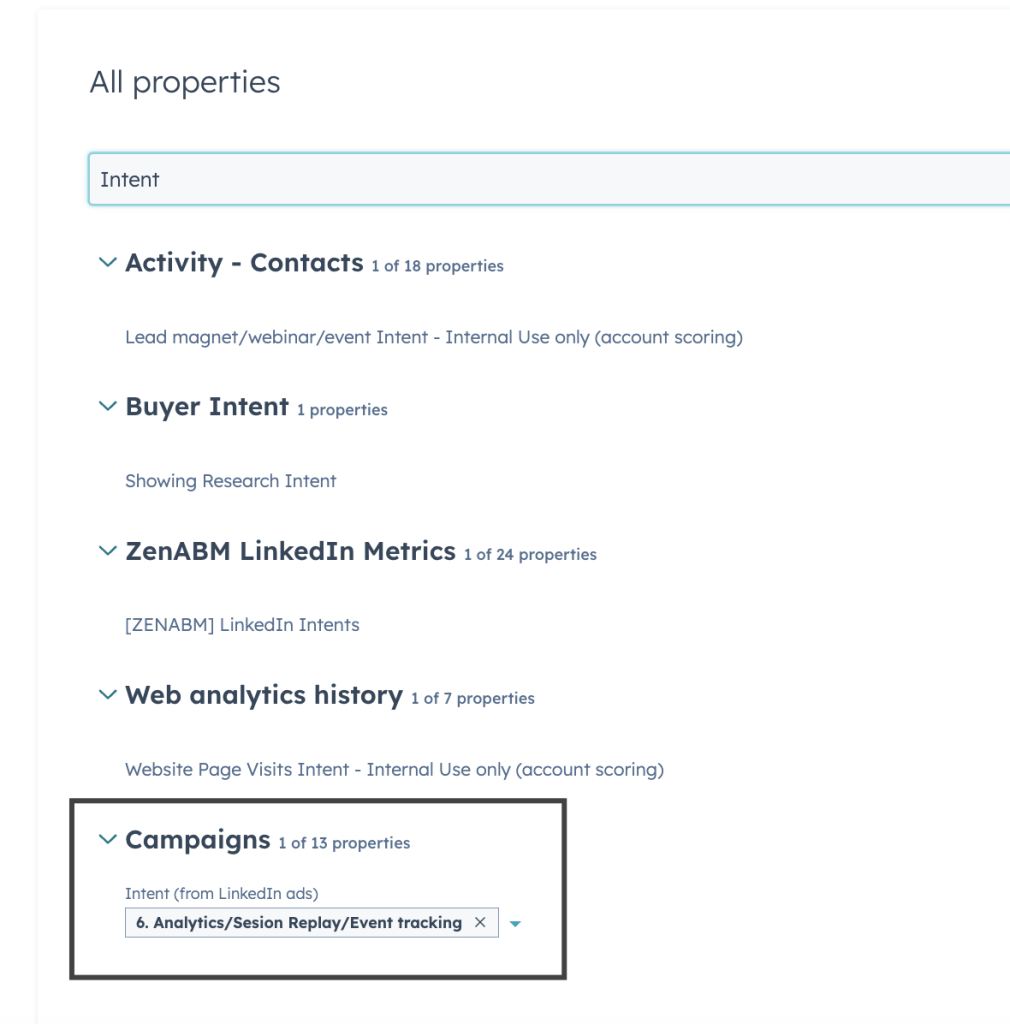
So, your team puts efforts on the right accounts, at the right time and lures prospects with the right feature ;).
Plug-and-Play ABM Analytics Dashboards
With ZenABM, you don’t have to build dashboards or reports on your own.
The tool offers plug-and-play ABM dashboards to calculate metrics like ROI, ROAS, etc, of your LinkedIn ads ABM campaigns:

In short, ZenABM helps you switch from click-through to view-through attribution model, while also providing a hub to do all the ABM Math!
Pre-defined ABM Objects for Efficiency
ABM provides you with multiple pre-defined objects like ABM campaigns, campaign groups, and campaigns out of the box, so you don’t have to keep reorganising your data at different levels for different campaigns.
ABM Stage Tracking
Also, ZenABM tracks each company’s ABM stage based on the engagement data collected and the rules you set:
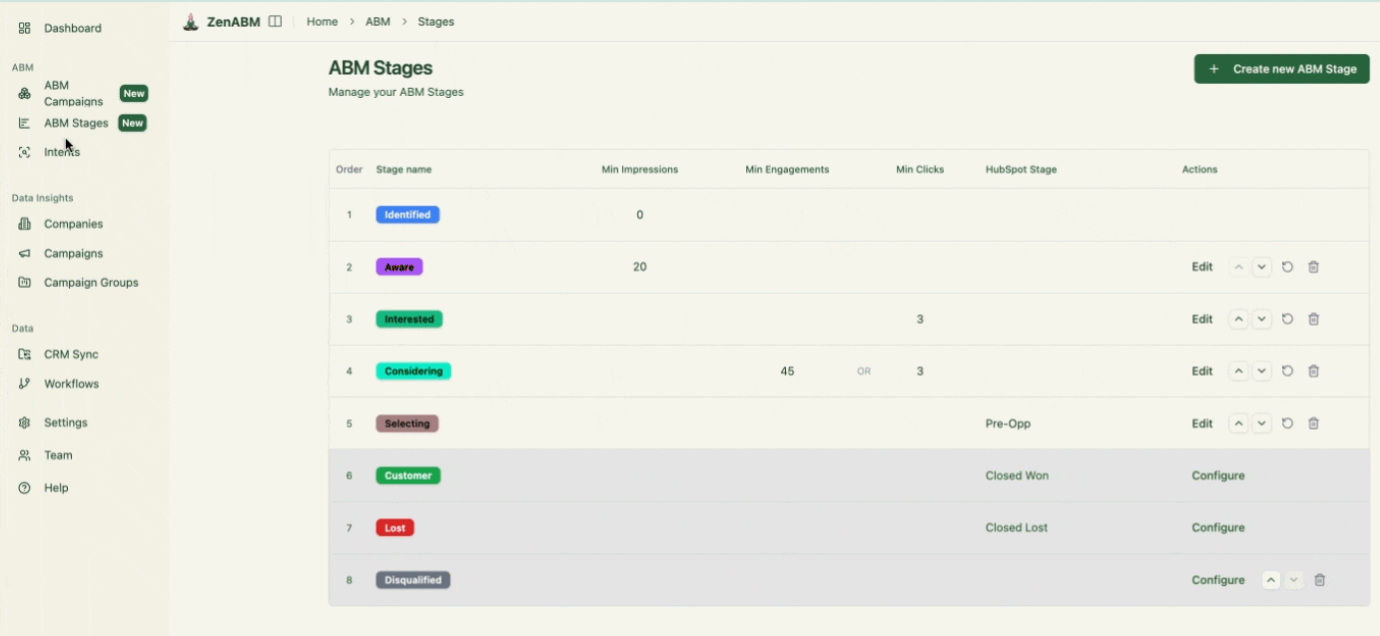

ZenABM Pricing
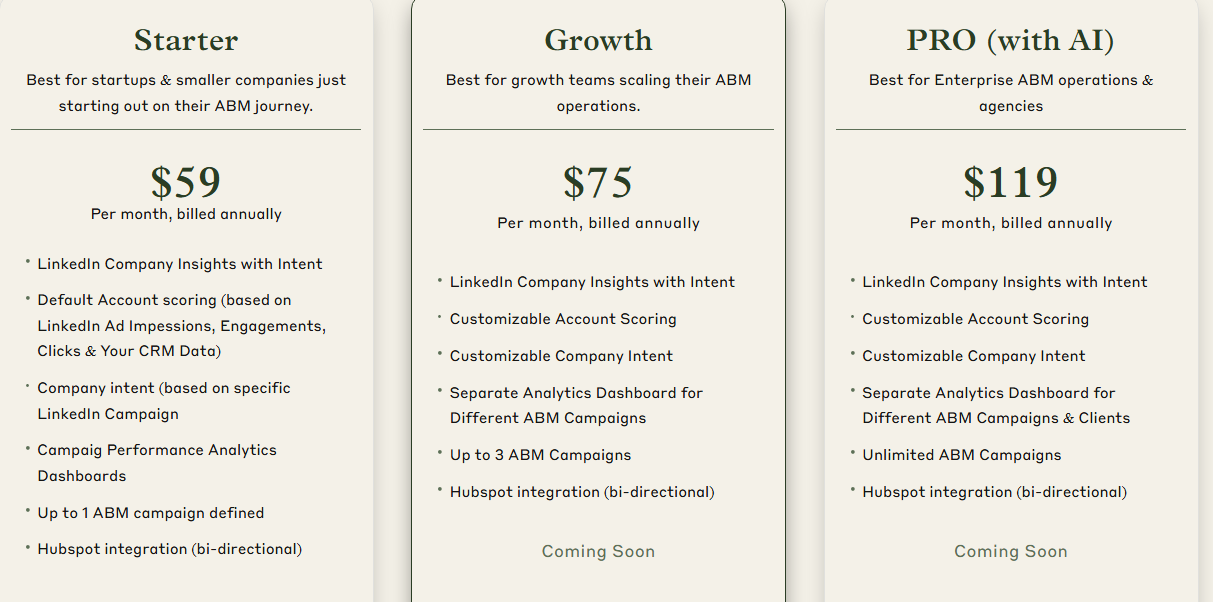
ZenABM offers three straightforward plans designed to grow with your ABM journey.
The Starter plan at $59/month (billed annually) is perfect for early-stage teams, offering LinkedIn company insights, default account scoring based on ad and CRM data, campaign-level intent, one ABM campaign, and native HubSpot bi-directional sync.
The Growth plan, at $75/month, adds customizable scoring, separate dashboards for up to 3 campaigns, and upcoming features like BDR assignment, Slack alerts, and weekly email reports.
For enterprise teams and agencies, the Pro plan at $119/month unlocks unlimited campaigns, client-specific dashboards, and upcoming AI-powered workflows like smart impression capping and campaign automation.
All plans come with a free trial, and if you need to know more, you can book a demo here.
End Note
Conventional tools fall short when it comes to LinkedIn ad attribution, mainly because they track clicks, not actual influence. In the world of B2B, where decisions span multiple stakeholders and channels, this means LinkedIn gets severely undervalued.
ZenABM changes that. By combining LinkedIn’s official API data with bi-directional CRM syncing and campaign-level engagement tracking, it delivers real multi-touch, view-through attribution. So you get credit where it’s due and the clarity to scale what works.
Want to know if your LinkedIn ads actually influenced the pipeline? ZenABM tells you exactly that without the manual hustle.
ZenABM does exactly that. Try its free trial now or book a demo.


